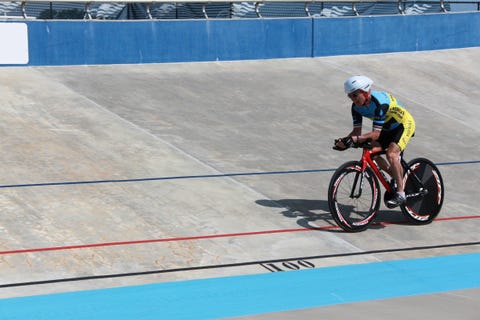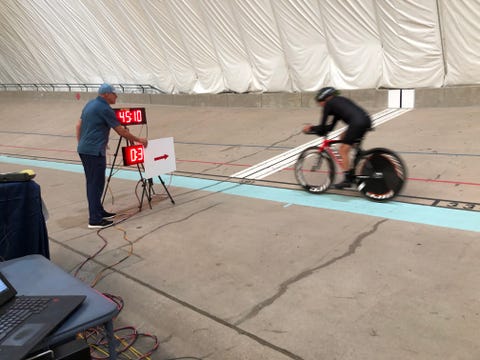At 91 years old, Carl Grove of Bristol, Indiana, has accomplished more in the last 10 years than most people ever will in a lifetime. But for him, it’s just business—or rather, life—as usual.
In August, Grove broke two cycling world records for the 90-94 age group. First, he set the hour world record—or the Best Hour Performance, as it’s called by UCI—at the Colorado Springs Velodrome with a distance of 21.44 miles, breaking the previous mark of 18.9 miles, which was held by French cyclist René Gaillard. (He and his team were able to rent out the velodrome using the proceeds from a GoFundMe page set up by his training partner and U.S. Paralympian Bruce Gordon.) Grove’s record will become official after the results of his drug test come back.
Then, just two days later, Grove broke the world record for the fastest 20K time trial at the USA Cycling Masters Road National Championships in Colorado Springs with a time of 32:59.09, six minutes ahead of the previous mark. This record is already official, Randy Shafer from USA Cycling confirmed to Bicycling.
Grove was the only cyclist to compete in his age category at nationals. But with the time trial, not only did Grove claim the best time, he beat the times of everyone in the 85 to 89 age category—and had the third best time in the 80 to 84 group.
“It’s not like he’s just winning because he’s the only one,” Gordon told Bicycling. “He’s an amazing, talented athlete.”
Grove is no stranger to winning races and breaking records. On the track, he also holds the records for the 200-Meter Flying Start (85+), the 500-Meter Standing Start (80-84 and 85+), and the Two-Kilometer Standing Start (80-84 and 85+). And that’s all since 2012.
So, how has Grove managed to ride strong into his 90s? We gathered his tips for you below, along with examples of how he’s living proof that they work.

Bruce Gordon
“Be aware of the beauty around you.”
Last year, Grove came close to picking up two more official records, but was stripped of those titles after failing a drug test when he tested positive for epitrenbolone and clomiphene. Grove and his team determined—and the United States Anti-Doping Agency acknowledged—that he unknowingly consumed the banned substances through tainted meat (liver, specifically) that he had for dinner one night.
While it was an unfortunate occurrence, Grove and his team remain adamant about completing drug tests, often to the extent of pestering USADA officials in order to ensure testing will take place.
Grove took what happened in stride. One of his tips is to focus on the positive and “be aware of the beauty around you.” There’s a lot to be thankful for, and a lot of living still to be done—whether you’re out to break world records or just cruising around town on your favorite set of two wheels.
“Hang out with younger people.”
Grove has had a long history with cycling. He started riding at 5 years old and proved to have a knack for it right from the start.
“My dad bought me a little tiny bicycle, a two-wheeler, for a dollar and a quarter from a neighbor down the road,” Grove told Bicycling. “I can remember that day like it was yesterday. I got on it, and I rode it. He gave me a shove, and I went on down the road.”
While Grove got an early start with riding, it wasn’t until his 40s that he started cycling seriously. While living in Washington, D.C., he fell into a group of talented cyclists in their late teens and early 20s. Riding with younger people really pushed Grove to progress on the bike.
He said the same is still true today. Along with Gordon—who’s 62 and started riding with Grove in 1974—Grove currently rides with some “exceptionally good riders” back home in Bristol, Indiana. He’s also a member of team Pista Elite out of Cleveland, Ohio, which is made up of riders of all ages.
Grove said he largely has them to thank for his success on the bike, along with his coach Kathy Watts of Velocious Endurance Coaching, for encouraging him to pursue competitive cycling and for helping him to approach training in the right way.
[Find 52 weeks of tips and motivation, with space to fill in your mileage and favorite routes, with the Bicycling Training Journal.]
“Just keep pedaling.”
Instead of riding less as he aged, about 10 years ago Grove decided to fully dedicate himself to training.
In 2010, Grove made it to nationals and out-rode his competitors. He then went to the Masters World Championships in Austria, where he placed fourth in the time trial. The following year, Grove went back to the world championships, where he won the time trial by over three and a half minutes; in the mountainous 40K road race, Grove placed fourth.
Grove stood on the podium, listening to the sound of the United States national anthem and watching them hoist the flag—and he was hooked.
“I was thrilled to death,” Grove said. “And it takes quite a bit to thrill me.”
But he didn’t stop there. A year or so later, Grove decided he wanted to try track cycling. It looked like fun, he thought.
“He called me one night and said, ‘I want to start track racing,’” Gordon said. “I asked if he was drinking.”
Studies have shown that regular exercise, like cycling, can help lower your “performance” (or physiological) age, compared to your chronological age. So, if you want to be just like Grove when you’re older, you don’t necessarily need to chase down world records (unless you want to). All you have to do is keep riding.

“I don’t care what you do, as long as you do something.”
At this point, Grove has lost track of how many races he’s won. He gives his medals to his grandchildren and great-grandchildren. For him, the most important part of continuing to ride and race has been to show others what’s possible, even as they age.
“I really try to show people that are older what they can do, and how they can do it, the attitude and everything,” Grove said.
Grove noted how important it is to stay active and keep busy as you age. It’s what his parents did; his father worked until he was 93 and died when he was 97, while his mother lived to be 105. When asked what he’s setting his sights on next, he isn’t exactly sure.
“I might take a shot at playing the bagpipes again,” Grove said. Apart from staying physically active, keeping your brain active is just as important as you age. And research backs it up—learning new skills will help keep you younger, whether it’s track cycling or bagpipes.
As for cycling, he thinks he’ll never give it up.
“I’ll probably never stop riding, well, because I don’t want to sit down.”
From: Bicycling US
Source: Read Full Article






